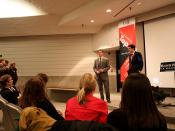Egoism Versus Altruism: Ayn Rand's The Fountainhead
Ayn Rand in her controversial novel, The Fountainhead, written in 1935, depicts a man's struggle for independence and freedom from the tyranny of a collective society. Howard Roark is the heroic, redheaded architect whose selfish desire to express his own truths makes him incapable of destruction despite the efforts of the people. Set in the streets of New York in the 1920s during the age of the skyscraper, the novel conveys the effort to retain individuality in the face of negative forces. Ayn Rand uses scholarly diction, narrative technique, and unique imagery to institute a theme of individuality versus collectivism, where the egotistical characters strive to act independently and are constantly brought down by society. In The Fountainhead, humanity has a herd mentality, and the individuals must act selfishly in order to be free.
Living in St. Petersburg, Ayn Rand was influenced into writing stories with heroic visions, which thoroughly opposed the mysticism and collectivism of Russian culture.
She witnessed the Kerensky and the Bolshevik Revolutions first-hand before her family moved to America, and she immediately took the States as her model of what a nation of free men could be (The Institute of Ayn Rand). She struggled for many years at various non-writing jobs before Ayn sold her first screenplay, "Red Pawn." Ms. Rand went on to publish a stage play, Night of January Sixteenth, and several novels such as, We the Living, The Fountainhead, and Atlas Shrugged. In all of these works of fiction, Ayn Rand dramatized her unique philosophy of the individual versus the whole in an intellectual style filled with imagery, intelligent diction, and narrative technique. While Rand believed that one ought to be selfish, Thomas Hobbes, an English philosopher, argued that the self of a human being is...


